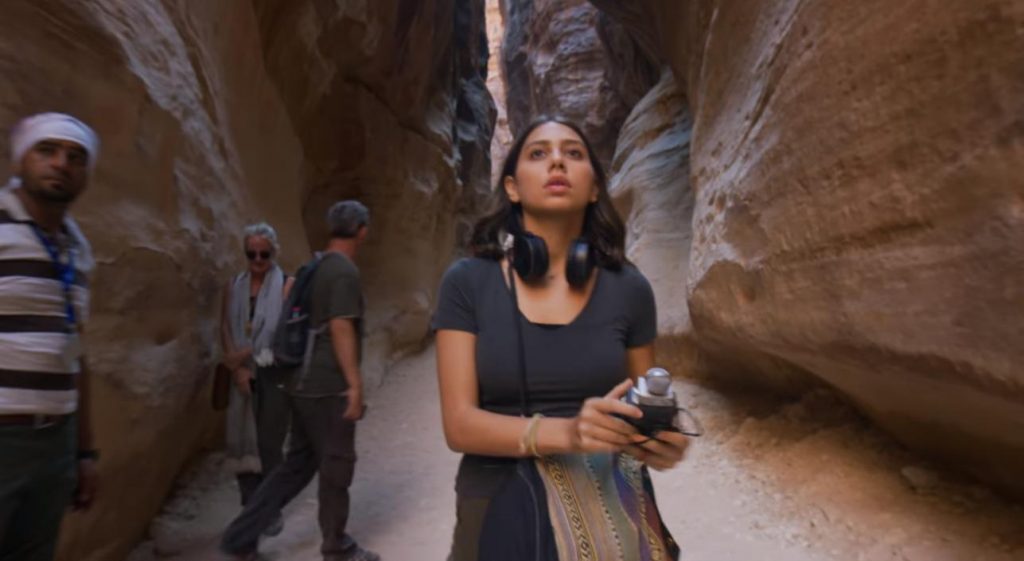São Paulo – The freedom of the Jordanian youth faces the ancestral folklore in “Jinn,” the first Arabic Netflix original, which premiered earlier this month. The TV show seems to want to change the perception the world has of the Middle Eastern youth, with a drama filled with mystery, music, drinks, drugs and relationships. Warning: *SPOILERS* ahead.
A group of high schoolers from Seven Hills Academy in Aman makes a trip to Petra to get to know the ancient town carved into the red stone mountains. Before they even arrive, the story of jinns is mentioned by some characters. Petra seems to be a mystical place where these creatures – which may be good or evil – may appear and possess the body of humans and animals.
The young actors are new to the industry. The main character is Mira, played by Salma Malhas, a Palestinian actress raised in Jordan. Mira is a progressive young woman who stands up against the machismo of her colleagues and her love interest Fahed (played by Yasser Al Hadi).
Mira loves music and sounds, and she takes a recorder on her trip to Petra to capture the outside noise of passing cars, people, and animals, when she starts noticing Strange Whispers (the title of the first episode), and unexpected things start happening. A local guide tells her that jinns are real and may be heard through the stone walls.
The school bully Tareq (Abd Alrazzaq Jarkas) attacks Yassin (Sultan Alkhail) and leaves him stuck in a hole inside the ruins. Yassin gets desperate while trying to get out when a scorpion bites his hand. After a lot of screaming, the teenager Vera (an evil jinn played by Aysha Shahaltough) comes to his rescue. So begins a suspicious friendship between them.
In the late evening, comes one of the most beautiful scenes of the show in a candlelit Petra’s Treasury (a UNESCO world heritage) where a guide tells stories about the place. Meanwhile, the kids go to a secluded place to drink and smoke hashish. Before they leave, Tareq faces a tragic death, falling from one of the mountains. Before he falls, he sees the appearance of a Bedouin young man (Keras, played by Hamzeh Okab), who tries to warn him against his imminent death.
Tareq falls when Mira is leaving. She finds his body and they all go home in shock. She can’t talk to her father (Khaled, played by Eyad Hourani), one of the few sensitive men on the show. She also has to deal with her mother’s and brother’s death – they don’t go into a lot of details, we don’t know what actually happened to them until the last episode, when Vera says she can find those who killed her family. Still grieving, his father tries to connect with her and doesn’t punish her for what happened.
Bad language, alcohol, hashish, sexuality, and mystery surround the narrative, filled with a toxic masculinity present in almost every boy, who curse, fight and offend for the sake of “respect” and ego. There are many conflicts among the boys themselves and with the female characters. It may be an accurate portrait of the Jordanian youth as well as a criticism of the customs.
The Bedouin Keras appears at Mira’s house – in a beautiful special effect of sand – and warns her she’s the only one capable of saving her friends, who are in danger. In the next morning, the school holds a funeral for Tareq, and his apparently possessed best friend Nasser (Mohammad Nizar), tries to kill himself with a knife.
In an attempt to gain followers in his social media profile, Hassan (Zaid Zoubi) convinces their teacher Ola (Hana Chamoun) to return to Petra and unveil the mystery of jinns (episode 4, #JinnHunter).
The highlights of the show are the scenes in Petra, the careful photography and special effects at the appearance of the jinns, with water and sand, as well as the sound design, which sets the tone for the show. Mira e Kera try to prevent other problems from happening and, by the fifth episode, other characters are possessed by the jinn, evil forces, including their friend (Ban Halaweh). Keras is the only supposedly good jinn to appear to help.
The first season ends with a cliffhanger. Netflix hasn’t announced yet if there will be a second season.
The series has stirred controversies in Jordan because of the scenes involving kisses, alcohol and drug use.
Translated by Guilherme Miranda









